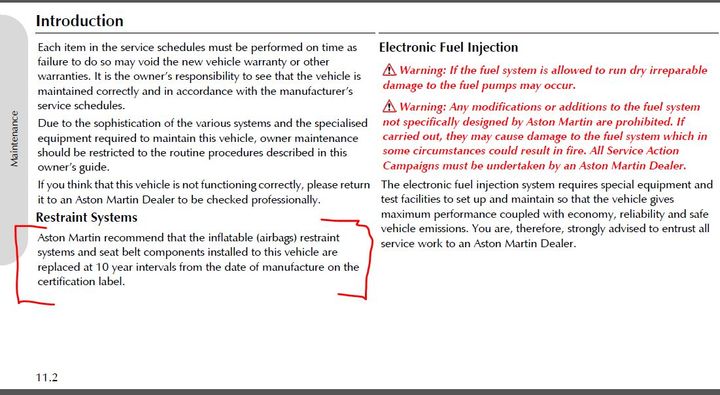Airbags replaced after 10 years?
Discussion
Just a question for the other Aston owners on here. While looking through the Owner's Manual for my 2015 V8V for something else I noticed this paragraph at the start of the Maintenance section:

- Do your handbooks say the same?
- Has anyone here replaced all their airbags at 10 years?
markiii said:
I doubt anyone has, not really cost effective
^^^This, I would bet that other than as a result of an accident or a false deployment not a single person in the world has ever replaced an airbag or seatbelts as part of routine maintenance / servicing. I haven't even ever heard of a service department trying to upsell new airbags or seatbelts as a recommended service item either...
This isn't just an Aston thing either, no reason why Aston airbags or seat belts would need replacing any sooner than other makes.
It's normal for the manufacturers of any equipment or system to place a time limit on operational service life. As stated above, and especially in case of what would be termed safety critical systems, it's partly to avoid being sued if some ancient piece of kit doesn't work as it should a long way down the line, partly redundancy and partly a precautionary measure to ensure that guidance has been provided by the OEM.
This sort of stuff is common in plant operations, especially with pressure vessels.
Where a replacement interval is so long (ie 10yrs) you can assume that service life can be extended if not indefinately, but very significantly longer. Condition is key, and as these types of systems perform a self check every single time ignition is switched on (or for EV owners, every time the vehicle is switched on), functional readiness is thus assured - assuming that the (in this case) airbag light goes off.
Beyond that, if a thorough visual inspection of key components and their immediate locations for corrosion, mechanical damage, contamination, damp etc is undertaken periodically, then it's safe to assume that if and when the time unfortunately arrives, they will function as intended.
This sort of stuff is common in plant operations, especially with pressure vessels.
Where a replacement interval is so long (ie 10yrs) you can assume that service life can be extended if not indefinately, but very significantly longer. Condition is key, and as these types of systems perform a self check every single time ignition is switched on (or for EV owners, every time the vehicle is switched on), functional readiness is thus assured - assuming that the (in this case) airbag light goes off.
Beyond that, if a thorough visual inspection of key components and their immediate locations for corrosion, mechanical damage, contamination, damp etc is undertaken periodically, then it's safe to assume that if and when the time unfortunately arrives, they will function as intended.
Calinours said:
<snip>
Where a replacement interval is so long (ie 10yrs) you can assume that service life can be extended if not indefinately, but very significantly longer. Condition is key, and as these types of systems perform a self check every single time ignition is switched on (or for EV owners, every time the vehicle is switched on), functional readiness is thus assured - assuming that the (in this case) airbag light goes off.
Beyond that, if a thorough visual inspection of key components and their immediate locations for corrosion, mechanical damage, contamination, damp etc is undertaken periodically, then it's safe to assume that if and when the time unfortunately arrives, they will function as intended.
I get this, and I only started the thread out of curiosity, as some (but not all) Aston Owners are probably in the "whatever it costs" camp when it comes to maintenance. I also didn't know if dealers have mentioned it to anyone on the 10-year serviceWhere a replacement interval is so long (ie 10yrs) you can assume that service life can be extended if not indefinately, but very significantly longer. Condition is key, and as these types of systems perform a self check every single time ignition is switched on (or for EV owners, every time the vehicle is switched on), functional readiness is thus assured - assuming that the (in this case) airbag light goes off.
Beyond that, if a thorough visual inspection of key components and their immediate locations for corrosion, mechanical damage, contamination, damp etc is undertaken periodically, then it's safe to assume that if and when the time unfortunately arrives, they will function as intended.
However, in the case of airbags and pre-tensioners, whilst the system checks for electrical integrity at every key-on event, you have an explosive material in the squib that could deteriorate with time and moisture and I don't think that would be detected. I doubt many people take their airbags out to structurally inspect them, either. It's just Takata came to mind.
For the avoidance of doubt, I have no intention of even considering it in a year's time.
Gassing Station | Aston Martin | Top of Page | What's New | My Stuff



